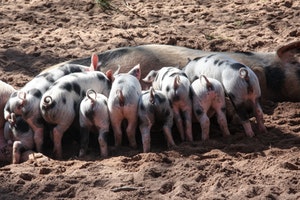Protecting children from allergies could begin in the first hours of life
16 May 2018

Peer Reviewed
RCT
Animals
Childhood allergies could be protected against in the first hours of an infant’s life, according to a new study.
An international team of researchers lead by the Universities of Reading and Bristol have conducted a study published in Frontiers of Immunology using piglets to show that exposure to extensive, outdoor farms during just the first day of life could reduce allergies.
Piglets were left with their mothers on either extensive (outdoor) or intensive (indoor) farms, while their siblings were reared from two days old in a ‘high hygiene’ environment and the development of their immune systems was investigated.
Dr Marie Lewis, a lecturer in Gut Immunology and Microbiology at the University of Reading said:
“There has been a marked increase in allergies over the last 50 or so years that can’t be by explained by genetics and we suspect that environmental factors play a key role. We know that growing up on a farm reduces the risk of children developing allergies.
“However, human studies often do not take the type of farm into account, and usually the children are on farms throughout childhood. By looking at two different types of farm, extensive and intensive, and also limiting farm exposure to very early on in life, we demonstrated that exposure to an extensive farm for the first day of life could reduce the risk of allergies”.
The potential for protection from allergy development is linked to the numbers of specialized immune cells in the gut, called regulatory T-cells, which suppress immune responses. The piglets which spent the first day of life on an extensive farm before being raised in a clean environment had much higher numbers of these T-cells than those which were born on an intensive farm and raised in the same clean environment.
Importantly, this potential for protection against allergies was lost if antibiotics were used, suggesting it involves the bacteria which enter the gut shortly after birth.
The first step in an immune response is the introduction of outside particles to the immune system, a process called antigen presentation, and the system then ‘decides’ how to respond. The paper suggests that different types of immune cell combination were involved in this initial presentation of particles depend on the type of farm and what time of life this farm exposure occurred.
Dr Lewis said:
“We are all born with very rudimentary immune systems which develop over time in response to the environmental particles we encounter, including food, bacteria and all sorts of dust. The farm environment is a complex mixture of bacteria, and animal and plant particles, and is difficult to generate in laboratory setting.
“However, taking farm animals, in this case piglets, into very hygienic environments during the neonatal period is a very good way to study how farm environments influence immune development.”
“Early development appears essential in generating a competent immune system which responds appropriately to the particles it encounters in later life, these particles could be disease causing pathogens, or harmless bacteria and pollen. Allergies are inappropriate inflammatory responses to such harmless particles.
“This research is especially relevant to infants who are at greater risk of developing allergies, such as those born by caesarean section, or those receiving antibiotics as young babies. By identifying the precise factors present on a farm which reduce the risk of allergies, and understanding the immunological mechanisms involved, there is real potential to develop safe interventions which may mimic the protective effect of early farm life without exposing babies to the dangerous pathogens which can also be present on farms.”
Full citation:
Christoforidou, Z., Burt, R., Mulder, I., Gill, B., John, P., Denise, K., Christopher, S., Bailey, M. and Lewis, M. (2018) Development of immune cells in the intestinal mucosa can be affected by intensive and extensive farm environments, and antibiotic use. Frontiers in Immunology, 9. 01061. ISSN 1664-3224 doi: https://doi.org/10.3389/fimmu.2018.01061
